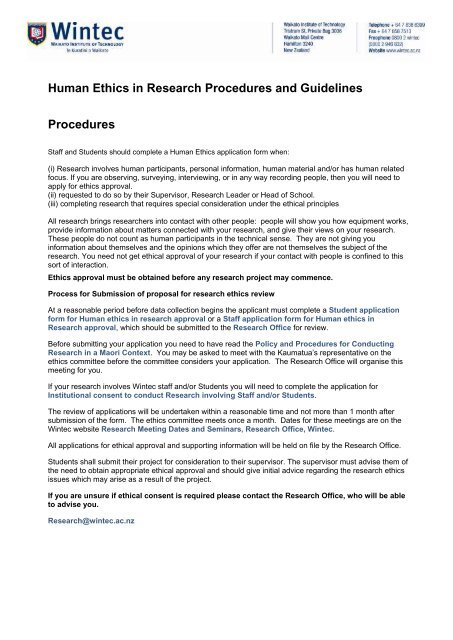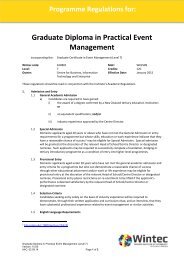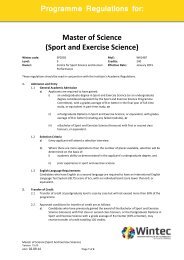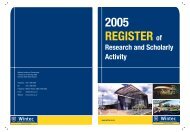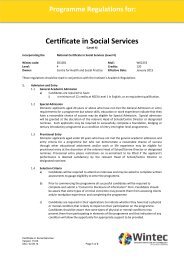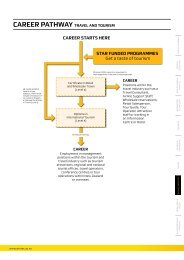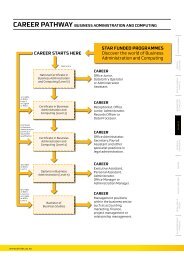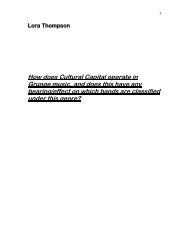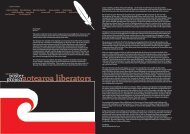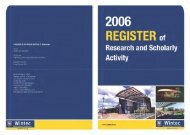Human Ethics in Research Procedures and Guidelines ... - Wintec
Human Ethics in Research Procedures and Guidelines ... - Wintec
Human Ethics in Research Procedures and Guidelines ... - Wintec
Create successful ePaper yourself
Turn your PDF publications into a flip-book with our unique Google optimized e-Paper software.
<strong>Human</strong> <strong>Ethics</strong> <strong>in</strong> <strong>Research</strong> <strong>Procedures</strong> <strong>and</strong> Guidel<strong>in</strong>es<br />
<strong>Procedures</strong><br />
Staff <strong>and</strong> Students should complete a <strong>Human</strong> <strong>Ethics</strong> application form when:<br />
(i) <strong>Research</strong> <strong>in</strong>volves human participants, personal <strong>in</strong>formation, human material <strong>and</strong>/or has human related<br />
focus. If you are observ<strong>in</strong>g, survey<strong>in</strong>g, <strong>in</strong>terview<strong>in</strong>g, or <strong>in</strong> any way record<strong>in</strong>g people, then you will need to<br />
apply for ethics approval.<br />
(ii) requested to do so by their Supervisor, <strong>Research</strong> Leader or Head of School.<br />
(iii) complet<strong>in</strong>g research that requires special consideration under the ethical pr<strong>in</strong>ciples<br />
All research br<strong>in</strong>gs researchers <strong>in</strong>to contact with other people: people will show you how equipment works,<br />
provide <strong>in</strong>formation about matters connected with your research, <strong>and</strong> give their views on your research.<br />
These people do not count as human participants <strong>in</strong> the technical sense. They are not giv<strong>in</strong>g you<br />
<strong>in</strong>formation about themselves <strong>and</strong> the op<strong>in</strong>ions which they offer are not themselves the subject of the<br />
research. You need not get ethical approval of your research if your contact with people is conf<strong>in</strong>ed to this<br />
sort of <strong>in</strong>teraction.<br />
<strong>Ethics</strong> approval must be obta<strong>in</strong>ed before any research project may commence.<br />
Process for Submission of proposal for research ethics review<br />
At a reasonable period before data collection beg<strong>in</strong>s the applicant must complete a Student application<br />
form for <strong>Human</strong> ethics <strong>in</strong> research approval or a Staff application form for <strong>Human</strong> ethics <strong>in</strong><br />
<strong>Research</strong> approval, which should be submitted to the <strong>Research</strong> Office for review.<br />
Before submitt<strong>in</strong>g your application you need to have read the Policy <strong>and</strong> <strong>Procedures</strong> for Conduct<strong>in</strong>g<br />
<strong>Research</strong> <strong>in</strong> a Maori Context. You may be asked to meet with the Kaumatua’s representative on the<br />
ethics committee before the committee considers your application. The <strong>Research</strong> Office will organise this<br />
meet<strong>in</strong>g for you.<br />
If your research <strong>in</strong>volves W<strong>in</strong>tec staff <strong>and</strong>/or Students you will need to complete the application for<br />
Institutional consent to conduct <strong>Research</strong> <strong>in</strong>volv<strong>in</strong>g Staff <strong>and</strong>/or Students.<br />
The review of applications will be undertaken with<strong>in</strong> a reasonable time <strong>and</strong> not more than 1 month after<br />
submission of the form. The ethics committee meets once a month. Dates for these meet<strong>in</strong>gs are on the<br />
W<strong>in</strong>tec website <strong>Research</strong> Meet<strong>in</strong>g Dates <strong>and</strong> Sem<strong>in</strong>ars, <strong>Research</strong> Office, W<strong>in</strong>tec.<br />
All applications for ethical approval <strong>and</strong> support<strong>in</strong>g <strong>in</strong>formation will be held on file by the <strong>Research</strong> Office.<br />
Students shall submit their project for consideration to their supervisor. The supervisor must advise them of<br />
the need to obta<strong>in</strong> appropriate ethical approval <strong>and</strong> should give <strong>in</strong>itial advice regard<strong>in</strong>g the research ethics<br />
issues which may arise as a result of the project.<br />
If you are unsure if ethical consent is required please contact the <strong>Research</strong> Office, who will be able<br />
to advise you.<br />
<strong>Research</strong>@w<strong>in</strong>tec.ac.nz
Guidel<strong>in</strong>es<br />
All Institute researchers, (staff <strong>and</strong> students) are expected to conform to the highest ethical<br />
st<strong>and</strong>ards <strong>in</strong> all their research relationships.<br />
The Chief Executive Officer is accountable for research conducted at the Waikato Institute of<br />
Technology (W<strong>in</strong>tec) <strong>and</strong>/or, has been supported or sponsored by W<strong>in</strong>tec.<br />
All staff at W<strong>in</strong>tec are accountable to the Chief Executive Officer for their actions.<br />
The Policy cannot protect staff or students from criticism or litigation.<br />
The Institute’s <strong>in</strong>surance does, however, provide cover for approved projects when the Institute’s<br />
policy <strong>and</strong> regulations have been followed.<br />
It is for this reason that the Institute or its delegated agents must approve formal research<br />
requests, which <strong>in</strong>volve human participants <strong>and</strong>/or artefacts.<br />
When conduct<strong>in</strong>g research, staff <strong>and</strong> students should be aware that:<br />
a. Intellectual Property considerations <strong>in</strong>clude ownership issues for data <strong>and</strong> research<br />
products <strong>and</strong> lawful access to data sets. <strong>Procedures</strong> <strong>and</strong> guidel<strong>in</strong>es for <strong>in</strong>tellectual<br />
property issues are dealt with <strong>in</strong> the Commercialisation of Intellectual Property Policy<br />
b. Any research developed must adhere to the procedures <strong>and</strong> policies embedded <strong>in</strong> the<br />
Pr<strong>in</strong>ciples <strong>and</strong> <strong>Procedures</strong>: Conduct<strong>in</strong>g <strong>Research</strong> <strong>in</strong> a Maori Context<br />
c. All research requests <strong>in</strong>volv<strong>in</strong>g staff <strong>and</strong> students at the Institute will be governed by the<br />
‘<strong>Research</strong>’ policy entitled “Institutional Consent to Conduct <strong>Research</strong> Involv<strong>in</strong>g the Institute’s staff <strong>and</strong>/or<br />
students<br />
Ethical Pr<strong>in</strong>ciples<br />
2.1 Self-determ<strong>in</strong>ation. This pr<strong>in</strong>ciple upholds the freedom of each person to make autonomous<br />
decisions. Refusal to participate or cont<strong>in</strong>ue <strong>in</strong> research must not result <strong>in</strong> adverse<br />
consequences for current or potential research participants.<br />
2.2 Informed Consent. Consent is voluntary <strong>and</strong> <strong>in</strong>formed if the <strong>in</strong>tended participant underst<strong>and</strong>s<br />
the benefits of the research <strong>and</strong> agrees without coercion to participate, has been provided<br />
with an explanation <strong>in</strong> terms the participant underst<strong>and</strong>s, <strong>in</strong>clud<strong>in</strong>g:<br />
a. the nature <strong>and</strong> purpose of the activities<br />
b. potential harmful consequences of tak<strong>in</strong>g part <strong>in</strong> the research<br />
c. participants’ rights, <strong>in</strong>clud<strong>in</strong>g the right to:<br />
• decl<strong>in</strong>e participation,<br />
• withdraw from the research at any time without penalty of any sort,<br />
• privacy <strong>and</strong> confidentiality,<br />
• negotiate the amendment <strong>and</strong> review of contributions <strong>and</strong> their ownership,<br />
• be offered an opportunity to debrief if necessary dur<strong>in</strong>g or on conclusion of<br />
participation,<br />
• receive feedback about the outcome of the activity <strong>in</strong> an appropriate form<br />
Confidentiality<br />
<strong>Research</strong> <strong>in</strong>formation should be h<strong>and</strong>led <strong>in</strong> a way, which protects the confidentiality of the<br />
participants <strong>and</strong> ensures the safe custody of the data. Care must be taken to protect the legitimate<br />
privacy of <strong>in</strong>dividuals, communities <strong>and</strong> <strong>in</strong>stitutions.<br />
Anonymity<br />
The f<strong>in</strong>d<strong>in</strong>gs should be conveyed <strong>in</strong> such a way that the participants cannot be identified as<br />
<strong>in</strong>dividuals, unless agreement to the contrary has been obta<strong>in</strong>ed from the participants.<br />
Participants must be <strong>in</strong>formed of the potential harmful effects to others of disclosure of the<br />
participants’ identity.<br />
Beneficence <strong>and</strong> Nonmaleficence<br />
In plann<strong>in</strong>g specific research procedures <strong>and</strong> conduct<strong>in</strong>g both pilot <strong>and</strong> ma<strong>in</strong>stream research, the<br />
researcher must ensure that the risk of cultural, social, physical, psychological, emotional <strong>and</strong><br />
spiritual harm to participants is kept to an absolute m<strong>in</strong>imum by:<br />
• a detailed explanation of the specific risks for any given research procedure<br />
• due consideration of alternative procedures to ensure optimal benefit<br />
• determ<strong>in</strong><strong>in</strong>g whether monitor<strong>in</strong>g <strong>and</strong> support procedures may be necessary both<br />
dur<strong>in</strong>g <strong>and</strong> after the activities<br />
Fair Treatment<br />
Subject to the ma<strong>in</strong>tenance of confidentiality <strong>in</strong> respect of <strong>in</strong>dividuals, all participants should be<br />
fully <strong>in</strong>formed about projects <strong>in</strong> which they are <strong>in</strong>volved. Also, <strong>in</strong> conduct<strong>in</strong>g the research, the<br />
researcher must at all times respect the rights, wishes, beliefs, consent <strong>and</strong> freedom of the<br />
2
<strong>in</strong>dividual participant.<br />
The pr<strong>in</strong>ciple of fair treatment also allows for volunteers to be compensated for the <strong>in</strong>convenience<br />
<strong>and</strong> time spent, although such compensation should not <strong>in</strong> any way be construed as <strong>in</strong>ducement<br />
to participate.<br />
Truthfulness <strong>and</strong> Integrity<br />
This refers to honesty <strong>in</strong> all deal<strong>in</strong>gs <strong>and</strong> <strong>in</strong>cludes issues such as conflict of <strong>in</strong>terest, bias,<br />
plagiarism, <strong>and</strong> hidden agendas, mak<strong>in</strong>g <strong>and</strong> keep<strong>in</strong>g commitments <strong>and</strong> generally be<strong>in</strong>g<br />
completely scrupulous <strong>and</strong> accountable <strong>in</strong> all research activities<br />
Justice<br />
This refers to the ethical obligation to treat each person <strong>in</strong> accordance with what is equitable,<br />
moral <strong>and</strong> proper, <strong>and</strong> to give each person what is due to him or her. It also refers to the equitable<br />
distribution of both the burdens <strong>and</strong> the benefits of participation <strong>in</strong> the research.<br />
Debrief<strong>in</strong>g <strong>and</strong> Disclosure<br />
Any data collection tool which uses less than full disclosure of the <strong>in</strong>tention of the study prior to its<br />
use, places an obligation on the researcher to clarify fully the nature of the study <strong>and</strong> remove any<br />
misconceptions that may have arisen. The researcher has a responsibility to ensure that there are<br />
no last<strong>in</strong>g negative consequences for the participant.<br />
When communicat<strong>in</strong>g research f<strong>in</strong>d<strong>in</strong>gs, material should be presented <strong>in</strong> ways that are easily<br />
understood by participants.<br />
Address<strong>in</strong>g Negative Consequences<br />
Where procedures might result <strong>in</strong> undesirable consequences, the researcher has the responsibility<br />
to anticipate where possible <strong>and</strong> endeavour to rectify any negative consequences that occur.<br />
Retention of Data<br />
This pr<strong>in</strong>ciple refers both to the protection of confidentiality of participants <strong>and</strong> to ensure that<br />
credibility of the research data can be verified. Data may <strong>in</strong>clude transcripts of <strong>in</strong>terviews,<br />
artefacts, documents <strong>and</strong>/or electronically stored data/<strong>in</strong>formation/records.<br />
.<br />
.<br />
3


